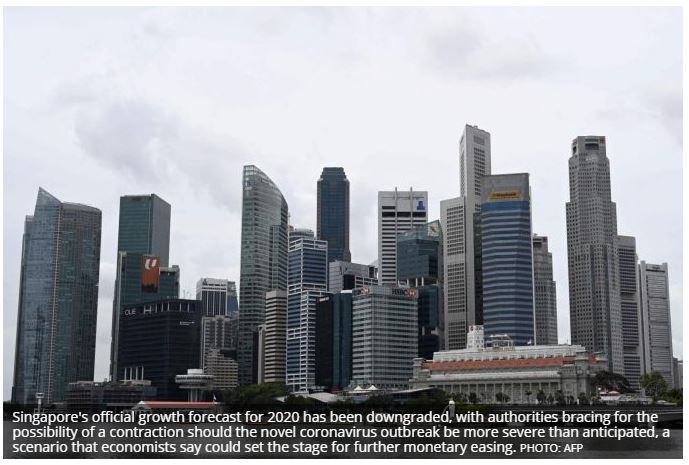Singapore cuts 2020 growth forecast amid virus outbreak
SINGAPORE’S official growth forecast for 2020 has been downgraded, with authorities bracing for the possibility of a contraction should the novel coronavirus outbreak be more severe than anticipated, a scenario that economists say could set the stage for further monetary easing.
The Ministry of Trade and Industry (MTI) is expecting full-year gross domestic product (GDP) growth to be between -0.5 per cent and 1.5 per cent, the ministry’s permanent secretary Gabriel Lim said on Monday.
“MTI’s baseline view at this juncture is for GDP growth to come in at around 0.5 per cent, the midpoint of the forecast range,” he said.
This is a worse outlook from the one MTI announced in November 2019, when it was expecting growth of 0.5 to 2.5 per cent. That forecast was made on the premise of a “modest pick-up in global growth, along with a recovery in the global electronics cycle” in 2020, Mr Lim said.
Singapore’s full-year GDP growth for 2019 was 0.7 per cent, on the back of a 1 per cent expansion in Q4 which exceeded advanced estimates.
Even though this is far slower than the 3.4 per cent expansion recorded in 2018 and also the slowest growth since the global financial crisis in 2009, economists were cautiously optimistic of a recovery in 2020.
This is because the Covid-19 outbreak is likely to dampen growth prospects of China and other affected countries in Asia.
Mr Lim said Singapore’s outward-oriented sectors like manufacturing and wholesale trade will be affected by the weaker growth outlook in several of its key final demand markets like China. The sharp fall in tourist arrivals as well as the decline in domestic consumption will also hit the tourism and transport sectors as well as retail and food services.
The last time Singapore saw negative full-year GDP growth was in 2001 during the Internet dotcom bust, when there was a 1.1 per cent contraction, MTI officials said.
MTI data shows that Singapore’s economy also took a beating from the severe acute respiratory syndrome (Sars) outbreak in 2003, with a 0.3 per cent contraction in Q2 at its height. Q3 and Q4 of the same year however saw respective growths of 5.3 per cent and 8.9 per cent, bringing full-year GDP growth to 4.5 per cent.
Whether the same V-shape recovery will play out for Covid-19 remains uncertain at this point, Mr Lim said, due to other uncertainties in the global economy, even as the ministry’s growth outlook for the US and the eurozone economies remain broadly unchanged.
However, despite the gloomy outlook, economists believe Singapore may be headed for slow growth rather than a recession.
DBS Bank’s growth forecast has been lowered to 0.9 per cent, while United Overseas Bank is expecting a 0.5 per cent expansion. OCBC posted a range of zero to 1 per cent growth,
Economists also believe the government’s support measures – to be announced at Budget 2020 by Finance Minister Heng Swee Keat on Feb 18 – will help to soften the blow for companies affected by the outbreak.
Selena Ling, chief economist of OCBC, wrote in a report: “Policymakers are also cognisant of the downside growth risks, so a strong Budget response and/or monetary policy response at the April MPS (Monetary Policy Statement) may help to mitigate and cushion some of the downside risks from here.”
Beyond “a strong fiscal response”, Irvin Seah, senior economist from DBS Bank, believes further monetary easing could be on the cards if growth prospects deteriorate further.
Citi economists are expecting a slope reduction from the Monetary Authority of Singapore (MAS), thanks to the lowered forecast and “broadening of growth weakness beyond manufacturing”.
“We continue to see a downward re-centering as less likely before a zero slope, while measures to aid companies’ cash flow … suggest upward pressure on short-term interest rates could be capped by money market operations,” Citi economists said.
Edward Robinson, deputy managing director for economic policy at MAS, said the central bank will continue to monitor Covid-19 developments closely ahead of its next monetary policy review in April. He added that MAS had indicated in its October 2019 monetary policy statement that it is prepared to recalibrate monetary policy should prospects for growth and inflation weaken significantly.
Source: https://www.businesstimes.com.sg/government-economy/singapore-cuts-2020-growth-forecast-amid-virus-outbreak


 Thailand
Thailand




